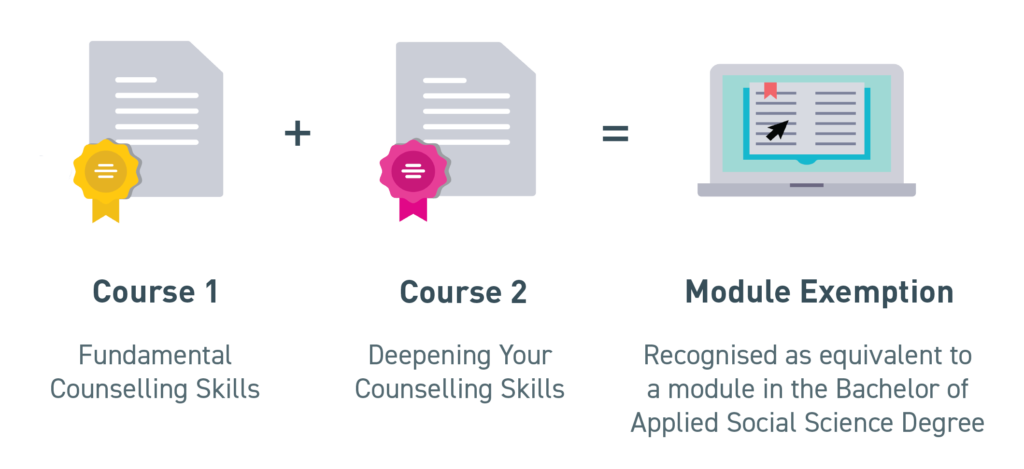At home or in the workplace, building and maintaining relationships is an important part of life. How you navigate your relationships can affect your level of personal and professional success and fulfilment. Hence, improving your relational skills is a must.
The goal of building relationships isn’t to achieve perfection, as we are always learning and growing. However, there are certain key skills you can learn that can help build new connections and improve your relationships. The more skilled you are in this arena, the more fulfilling relationships you can co-create. When you offer effective support to others, you will find yourself igniting growth in those around you. In this post, we’ll take a look at some of the most important relational skills you can learn and the benefits of being able to put these skills into practice. We’ll also provide some insight into the relational skills model and why it’s a helpful framework for developing fundamental counselling and relationship-building skills.
What are relational skills?
Relational skills are the capabilities you can develop to better interact with others and build more fulfilling and constructive relationships. These are essential in a formal counselling context, but can also be adapted for any kind of meaningful interaction, including in a workplace setting.
These core competencies include the following:
Attending skills
Attending skills involve being fully present with the person you are interacting with. This includes body language, nodding, eye contact and giving the person your full attention.
Active listening skills
Active listening involves not just listening with your ears and hearing what a person is saying. It involves listening with all of your senses, which also ties into being fully present and practising attending skills.
Contracting
Contracting is the process of agreeing to what will be discussed in a formal conversation. In a counselling session, contracting includes a discussion of the process that is going to take place. This is very important from an ethical and an effectiveness standpoint.
In a workplace environment, contracting could form part of official human resources processes or even weekly check-ins with a manager.
Paraphrasing
Paraphrasing is a type of verbal responding that shows that you are listening to what the other person is saying. Repeating what the other person has just said , but in different words, helps the other gain perspective, and can lead to deeper insights and clarity.
Summarising
Similar to paraphrasing, summarising is a way of showing the other person that you have listened to them. This is done by creating connections between different thoughts, feelings and behaviours and condensing them into a general theme.
Identifying and reflecting feelings
Identifying and reflecting feelings is an essential part of interacting on a deeper level with someone, especially in a counselling context. By being able to recognise and verbalise emotions, you can build stronger relationships as the other person feels heard and understood when empathy is expressed.
Asking questions
To be able to discuss more complex topics and get to know someone better, or address conflict, it’s important to ask the right kinds of questions. Closed questions can be replied to with a simple “yes” or “no”. However, open questions encourage the other person to reflect and provide an answer that leads to further discussion.
The skill of challenging
The skill of challenging involves thoughtfully identifying and bringing up inconsistencies in what another person is saying. Although used specifically in a counselling context to help build insight and forward progression, by honing this skill, you can learn to manage different points of view and constructively resolve conflict.
Use of immediacy and self-disclosure
Immediacy involves being able to skillfully use a situation or context in the present moment to increase awareness of behaviour by pointing out what seems to be going on. Self-disclosure includes using examples from your personal experience to offer insight. This needs to be done with care and ethical consideration, especially in a formal counselling context where the focus is on the client’s experience.
Empathy
Empathy is essential for building better relationships. It shows that you are taking the time to understand someone’s point of view and what they are experiencing, instead of only being sympathetic to their situation or distress.
Goal setting
Not all the relationships in your life will involve setting goals, but in the workplace and partnerships, learning how to set goals with someone else or a team can be very valuable for building constructive and harmonious relationships.
Action planning
Goal setting is a very helpful tool for assessing what your shared objectives are with another person or within a team. However, you won’t reach your goals unless you have a concrete action plan for how you’re going to achieve them.
Action planning involves mapping out the steps that need to be taken to achieve a goal. It should also include timelines as to when these steps need to take place.
Benefits of learning relational skills
As we mentioned in the beginning, all of the above skills have been designed to apply in a counselling setting, but can be used in all kinds of relationships in an adapted format.
Even if you can focus on developing more competency in a few of the above skills, you will be able to build better relationships with clients, colleagues, friends and family members. You’ll also be able to communicate better and manage conflict, which can lead to greater personal and career success.
It’s also important to remember that developing relational skills is valuable throughout your life, and not just a requirement when you reach a certain level of expertise or have worked your way up to a leadership position.
The relational skills model
To take your level of relational skills deeper, you can apply them according to the relational skills model. This model includes the following five stages:
- Stage 1: Get to know the person you are interacting with and engage with them.
- Stage 2: Create a safe environment for sharing and identifying problems.
- Stage 3: Explore the issues that have been brought up in more depth.
- Stage 4: Set goals and come up with possible strategies for resolving issues.
- Stage 5: Support and encouragement to implement goals, maintain change and develop strategies for self-management.
This model helps to break down the important stages of a relationship. It creates the space to discuss and explore issues, whether in a formal counselling, personal or business relationship. It’s a valuable framework in helping to ensure that engaging with another person is done constructively, in different contexts.
Learn about relational skills with SACAP Global
Do you have an interest in improving your relationship skills and learning more about how to apply these in a personal, workplace or counselling context? Then register for SACAP Global’s Fundamental Counselling Skills short course.
In this micro-credential, you will learn more about counselling terminology, key concepts and the relational skills model. This short course is stackable, which means you can combine it with another one of our courses, Deepening your Counselling Skills, to apply for module exemption within our Bachelor of Applied Social Science Degree (Majoring in Psychology and Counselling).

Contact us to find out more information about the Fundamental Counselling Skills and our range of flexible short courses.
